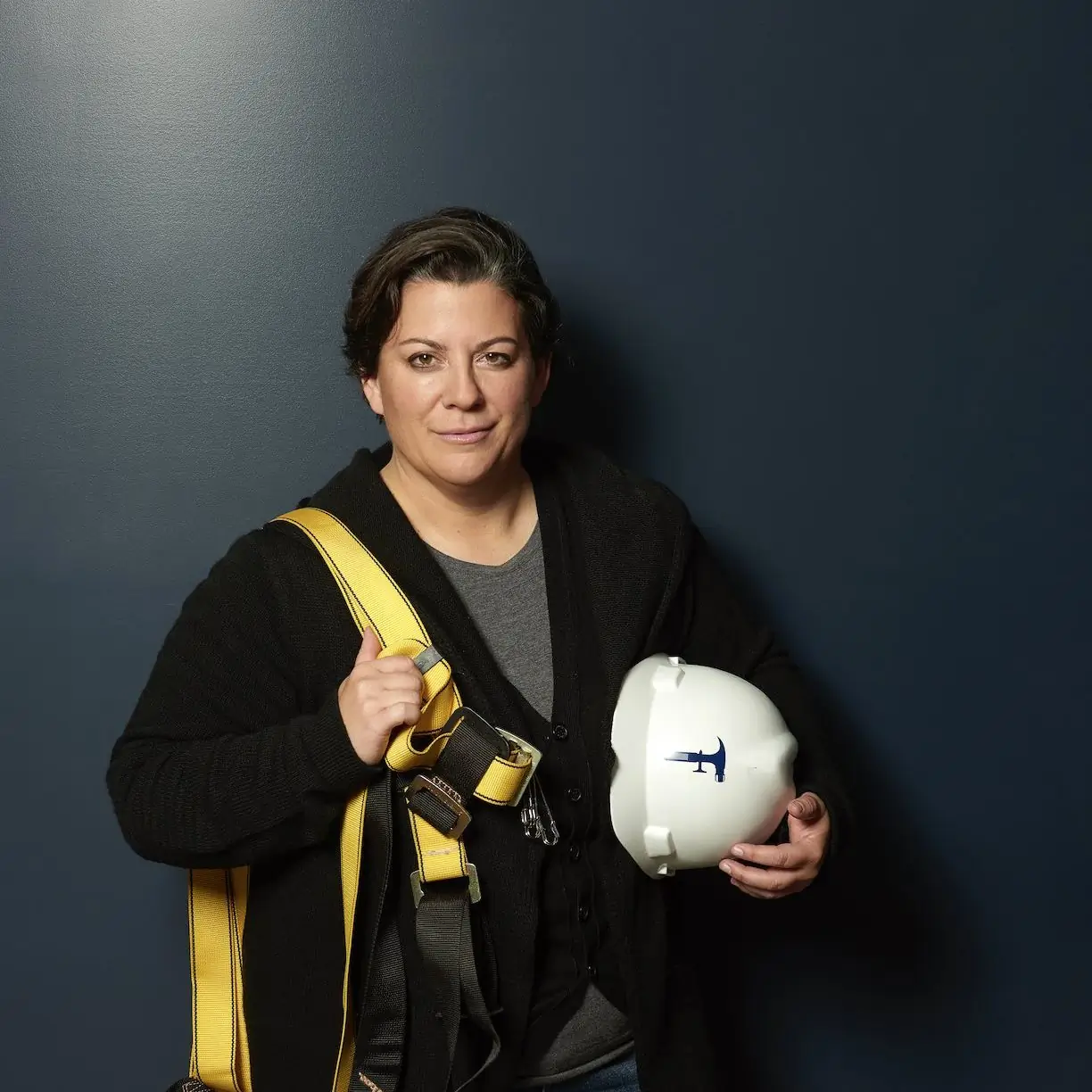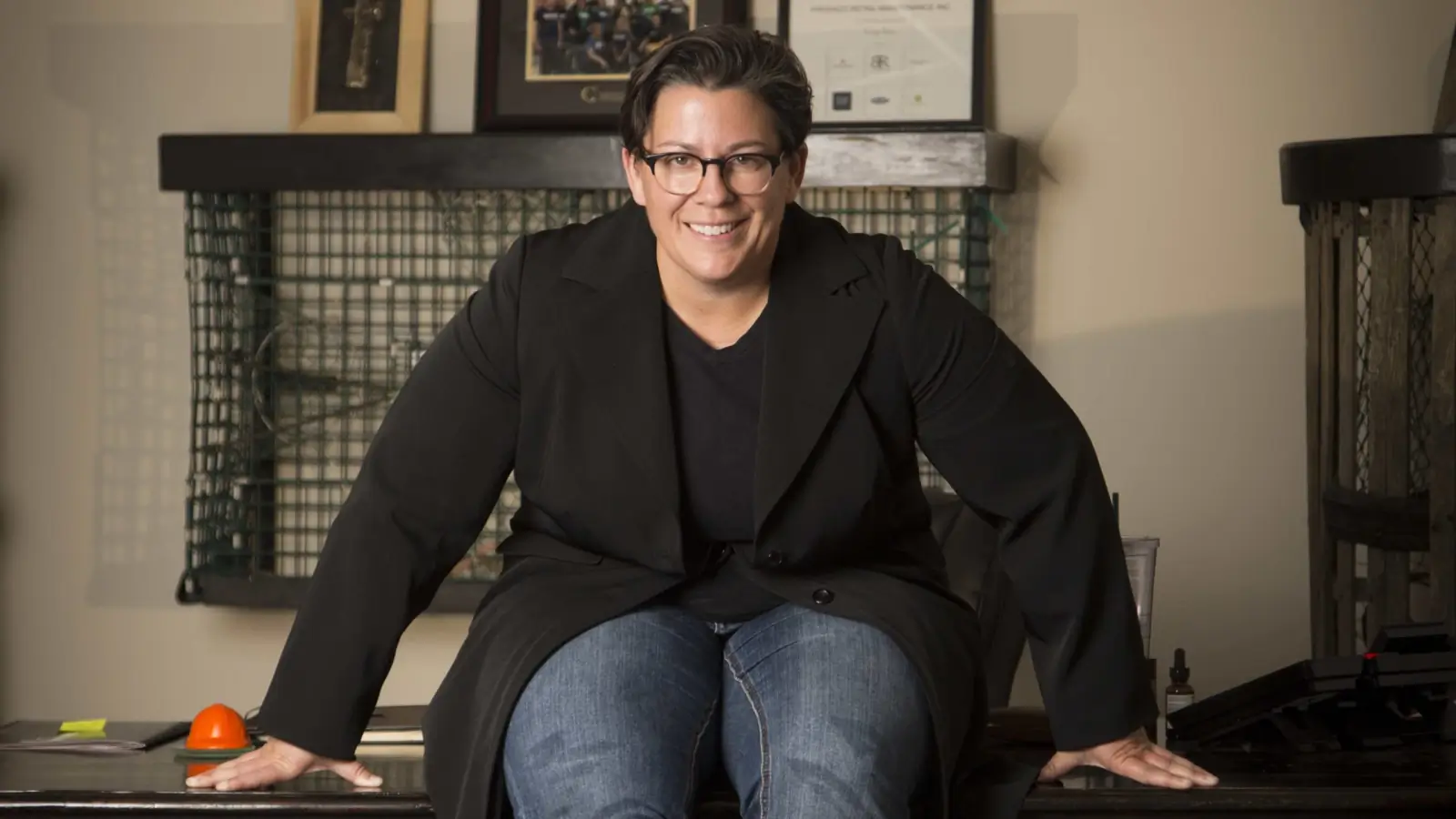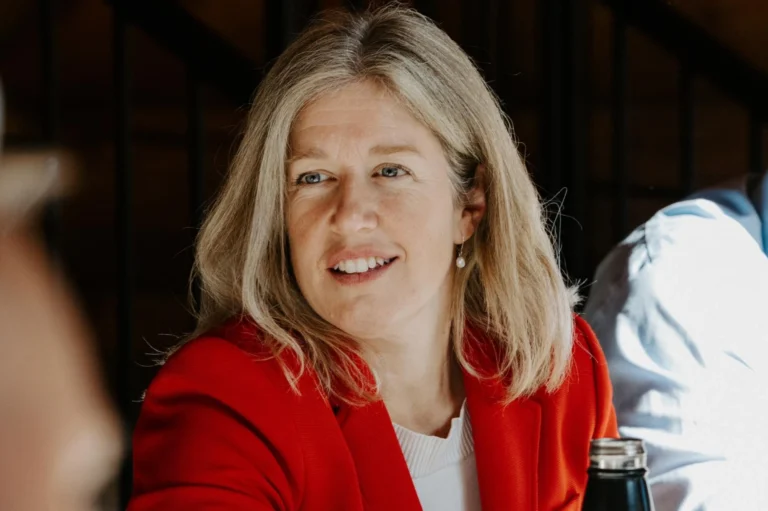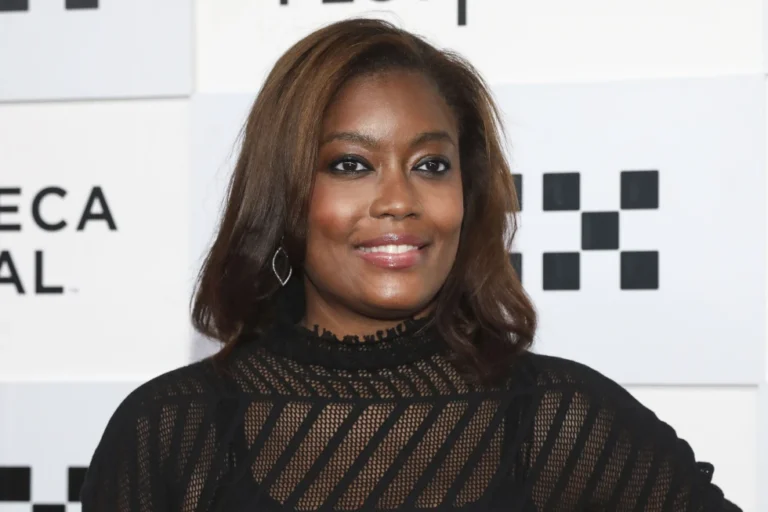Mandy Rennehan – The Blue-Collar CEO, championing women in a male-dominated industry
She’s smart, wickedly funny, and totally down to earth, and she’s the Blue-Collar CEO. Mandy Rennehan, the founder of multi-million-dollar retail renovation company Freshco (not the grocery store!), is well known for her authenticity, sense of humour, and for championing women in a male-dominated industry.
In this candid conversation, Mandy – who has a show with HGTV and a soon-to-be-released book from HarperCollins – talks to Jen and Catherine about the entrepreneurial ambitions that emerged when she was a child in rural Nova Scotia, the power of ambition, and the importance of listening, learning, and being accountable.

Jennifer Stewart: Mandy Rennehan runs a multimillion-dollar retail renovation company called Freshco, which she started when she was pretty much still a teenager.
Catherine Clark: Part of Mandy’s success is that she tells it like it is. In fact, she’s known as the Blue-Collar CEO and she is now about to launch a new HGTV show called “Trading up with Mandy” which takes her back to her hometown of Yarmouth, Nova Scotia. We are really thrilled to have Mandy with us for a respectfully uncensored chat.
Mandy Rennehan: You came to the right place for honesty.
Jennifer Stewart: I think we all need a bit of honesty right now.
Catherine Clark: We do need a little honesty right now. And Mandy, you’ve certainly proven that that is a top goal in your books.
One of the lines that come out of my mouth before me even opening my eyes is, ‘I wake up like this; I don’t know any other way to be,’ and it’s paid me well over the years being authentic.
Mandy Rennehan
Mandy Rennehan: Growing up on the East Coast, it was, ‘Just get outside and get the stink blown off ya and be you.’ And that really was what resonated with me. Growing up over there was just, you know, everybody was authentic because that was just how we were raised. And for that I’m just so incredibly grateful. And if anybody ever had told me it would have yielded me millions, I would have told you you were crazy.
Humble beginnings and entrepreneurial spirit
Jennifer Stewart: That’s so funny. But it’s so true. I was just in St. John’s visiting my sister. And there is an air of authenticity about people from the East Coast. It’s amazing.
Mandy Rennehan: It’s refreshing, kind of like the air. It’s refreshing because I guess we can say that part of Canada has never been touched. It’s never been a place that anybody has looked and said, “Now listen, you need to fit inside this box. And you need to make sure that everything is within the cover, and you need to be this way or that way.” It’s just something that just wouldn’t resonate with the group over there. And I’m just trying to change everybody’s mind – and it seems to be working – that you just need to buy a property over on the east coast to enjoy the people, the food, and everything else.
Do not baby kids
Jennifer Stewart: Your company is going gangbusters, but you did start out from pretty humble beginnings. When you look back on your childhood – and I understand you had a little fishing business and you were pretty entrepreneurial – what drove that spirit in you?
Mandy Rennehan: I’ve been asked this for a long time. I didn’t pick it, it picked me. I was this from a very young age. I grew up in a seasonal fishing town where if you didn’t catch a bunch of lobsters, you didn’t eat. When you look at how I grew up, it was me and a whole street full of guys. And we were hungry. Because all we did was play outside. I think watching my parents fighting constantly about money, and seeing the sadness that it brought, I knew that money was going to be the solution.
I just knew that money seemed to be this thing that I could monetize and bring happiness. So at 10 years old, I was sneaking outside and headed down to the river. I was dipping these little fish called kayaks and putting them in feed bags that I’d gotten from the local farmer down the street. And because I was so gifted in sports, that was my way of learning how to motivate and leverage with the guys on the street to say, “Hey, if you help me dip kayaks that we can put on the back of my dad’s truck, so he can sell them in the morning, basically you can pick me for whatever we’re going to play after school.” And it worked. When you started seeing us out in the middle of the night at 10 years old, dipping these fish and my dad coming home and saying, “Oh, dear, you tell those guys on the street, they’re doing a good job.” And I said, “I certainly will” with a big wink. He would have never dreamed it was me until he caught me one night.
My father is a wonderful man, and he’s really chilled out over his life, and I think that was from me taking the worry out of his life. But back then, you could have called him a rageaholic. And when he caught me that night, I was like, “What do I do? Do I claim the fifth? Or do I just come out with it?” And so I explained to him that this was the big night, all of these kayaks were coming up from the ocean, and he just stared at me. He didn’t get mad, he just stared at me. And so he got my brothers, we all went down to where we were dipping these kayaks, and we filled more bags of fish than I’d ever seen in the month that I was doing it.
He still stares at me the same way today. The only difference is I buy him a new truck every three years, so there’s just a little bit of a difference. But he looked at me and he said, “Who are you? You’re a girl. You’re 10!” And even back then it never resonated with me, that being female should matter when it comes to love. And it never dawned on me that he would get mad at me for trying to make his life and Mom’s life better. And the thing is that I took that risk even back then. And it worked. And from that moment on, watching what that money did to our family only ignited the wiring that I preemptively had to be even more, and for whatever reason, I was completely taken away by structure. I don’t know why. Still, to this day, none of the males in my family or my mother could pound a nail. So I have no idea where it came from. It was just in me. And so with the money that I would get I was buying tools and assembling the same guys on the street to build log cabins in the woods and trying to figure out why my roof was caving in. And I didn’t understand trusses or how to build them. So, it really was something that I started from a young age, just to give you the very thin version of a fat story.

Catherine Clark: So we want to get to being a woman in a male-dominated industry, but I saw a clip of you talking about not babying your kids. And I’d really love to follow up on that, because a lot of the women listening to this are parents, and there’s a real change in how we were raised and how many are raising their kids. What did you mean by don’t baby your kids?
Mandy Rennehan: When I look at even at animals as parents, they allow you to be around for a little while, and then send you out to figure out how to hunt, how to protect yourself, how to get in from the cold. And when I look at how I grew up, I was loved. There was no question about it. But I was never babied. I want to be very respectfully uncensored with what I mean by that. I mean, nobody gave me anything. I had to work for it. There was never a time I felt sorry for myself because I didn’t know any different. When I’m watching the young people walk into my office today versus the people that I employed 25 years ago, they’re coming in with, “My mom told me that I’m great and so should you.” I think there’s a difference between encouraging your child and setting your child up to really not understand what the real world is.
Be true yourself
Jennifer Stewart: And you have the work ethic to back up all of your success. And when you started Freshco, you were a young woman in a very male-dominated field. How did you get people to take you seriously?
Mandy Rennehan: They liked me. I’m going to tell you a really thin version, but picture me standing in front of 1,600 people that are some of the brightest professionals in the world, apparently. And I walked up on the stage. And I looked at them, and the whole place went quiet. And they knew something was coming. And I said, “Listen, I’ve been sitting here for two hours. And I’ve heard and seen how incredibly bright you all are. But here’s my question to you. Are you likable?” Well, you would swear that the world had just farted. It was the craziest thing that happened in that moment. They all stared at me. And then they started staring at their friend and staring at the person next to them, wondering, “Am I likable?” Because it’s never been another thing that anybody’s ever talked about. And the fact of the matter is that when you look at my whole career, I never knew anybody else to be, but Mandy Rennehan. And when I would walk into a room with that work ethic, and that ambition, and that willingness to listen, and learn, and be accountable, and the fact that I can rhyme off more stories and more jokes. I was likable, even to the white male, who predominantly back then and still today is who’s running the trade industry.
Jennifer Stewart: Where’s the boundaries? We’ve got so many women on our show who care too much if they’re likable, and all their weight and their value are into whether they’re liked or not. So, where’s that boundary in terms of being likable and caring too much if you are likable?
Mandy Rennehan: I think that there’s two sides here. When I say I was likable, the reality was that I was in a male-dominated world and I had to be relatable, but I didn’t try to be, it just happened for me. And I think most women are completely likable when they’re just them. What’s happening is that they are told they need to be someone else. And because of that they’re complicating themselves, which in turn makes other people uncomfortable. The whole situation ends up being awkward. And then everybody walks away going, what the hell happened here? My message is that no matter whether you’re out for a beer with me, or you’re sitting in a corporate room with me, or I’m actually just standing in line with you at the grocery store, I never, ever change, because it’s exhausting. It’s exhausting. And it actually has taken away from our ability to see more progress, because we don’t know who we’re dealing with half the time.
Most women are completely likable when they’re just them.
Mandy Rennehan
Catherine Clark: How does that go over in a business sense, like when you walk into a room, and you’re just you, you must have had situations where people were taken aback?
Mandy Rennehan: I can tell you from the depths of my soul, that there’s no doubt about it, that there has been people that have paused, maybe even for upwards of 30 seconds. But after that 30 seconds, after they saw me being me, it was like I gave them permission to be them. And instantly, we got down to the best kind of business you can imagine. Because there were no airs, and instantly there was a trust, because I was going to tell them whether I could do it or I couldn’t. And that’s also been part of my success, is that I care too much about my brand. And who I am is that I would rather do $2 million a year in business instead of 200 if it means that my customer is going to be taken care of. And I think that that’s one of the things that women have: the ability to know when to put the brakes on. But we live in a world of instant gratification. And a lot of times it’s financial, that people are confused about what way they need to go, instead of naturally and organically following their gut. I always say this: I don’t follow my gut, I follow my bowels. My bowels tell me everything I need to know about a situation. If they don’t move, I’m good. If they do move, I’m like, “Okay, there’s something I need to dig into deeper here.”
Jennifer Stewart: I love it. Mandy, talk to us about your new HGTV show trading up.
Mandy Rennehan: What a ride! Many times people have said, “For the love of God, Mandy, why are you not on TV?” It had to feel right, and it had to be right. I don’t fit in a formula. And you can’t try to put me in a box. I’m so happy with the deal that I made with HGTV and the Scott Brothers, because they saw me for who I was. The show really does highlight what I believe in: it’s a partnership, and it’s the people behind the scenes in the trade industry that are really truly the beauty behind the sexy. They’re the ones putting it together. Nobody ever sees that, and that’s something we’re highlighting while also training and bringing apprentices into my world to see what goes into it. We were renovating historic homes in the middle of a pandemic, in the biggest headwinds that we’ve ever seen in supply chains. And also on top of that, it was the summertime in Nova Scotia. You try to find a tradesperson that’s not busy a year out!
Best piece of advice
Jennifer Stewart: Sounds fun! I can’t wait to tune in. What’s the best piece of advice you’ve ever received?
Mandy Rennehan: I would say that the best piece of advice that I ever received actually wasn’t even verbalized to me. It was shown to me by a wonderful woman that was my COO in my company for 17 years until the pandemic hit. And she every day was the black to my white. She brought me and my world to gray. Every chance she got, she always showed me that getting upset absolutely helps nothing. And she’s made me a calmer leader today. You know, coming from how I grew up, it was very much I was shown that reacting was the way to go. And so, yeah, that nonverbal advice from her has made me into who I am today. If there’s anybody out listening and watching, reactions only hurt you, and the people around you. There’s nothing in it for your bottom line. So that’s the best piece of advice, everybody.
Thank you for having me, and listen: if nothing else, for God’s sakes, go have some fun.









